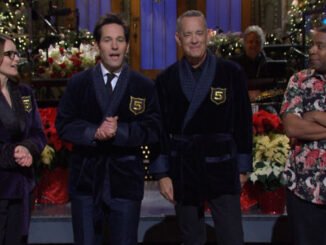 Following the murder of a museum curator at the Louvre, Paris police consult with Professor Robert Langdon (Tom Hanks) over some mysterious symbols the victim made with his own blood. Langdon soon discovers that the symbols point to a conspiracy to hide a secret that could potentially undermine the very foundations of the Catholic Church. Pursued by the Paris police, led by the determined Captain Fache (Jean Reno) and an albino assassin (Paul Bettany) working for a secret society out to destroy the secret, Langdon and police detective Sophie Neveu (Audrey Tautou) find themselves on the run, trying to unravel clues to find the mysterious secret before they are caught and killed by the pursuers.
Following the murder of a museum curator at the Louvre, Paris police consult with Professor Robert Langdon (Tom Hanks) over some mysterious symbols the victim made with his own blood. Langdon soon discovers that the symbols point to a conspiracy to hide a secret that could potentially undermine the very foundations of the Catholic Church. Pursued by the Paris police, led by the determined Captain Fache (Jean Reno) and an albino assassin (Paul Bettany) working for a secret society out to destroy the secret, Langdon and police detective Sophie Neveu (Audrey Tautou) find themselves on the run, trying to unravel clues to find the mysterious secret before they are caught and killed by the pursuers.
For all its popularity as a breezy summer afternoon page-turner, the film adaptation of The Da Vinci Code is anything but a fast-paced thriller. Ron Howard’s oppressive direction gives an air of inflated self-importance far in excess of what the material’s pulp-ish roots deserve. Adding to the film’s ponderous nature is its dark photography, which makes even daylight scenes look murky and overcast.
It is not that the film is boring or slow, it is just that there is no real feeling of building momentum to the movie. The early scenes of Hanks and Tautou’s characters dashing from gallery to gallery in the Louvre do contain a certain amount of energy, but this is the only time the movie has any liveliness to it. A story like this should just zoom along, with the characters on the run from the cops and the various other groups trying to get them, with a sense of dramatic urgency building as the danger mounts. Instead, Hanks and Tautou’s characters just seem to amble along, with no real urgency to their actions. The only real energy comes from Ian McClellan’s performance as Langdon’s mentor, probably because he knows not to take the material as seriously as everyone else seems to be doing.
 Another thing that undercuts the film is the sloppiness in which the book was adapted to film. As the picture opens, we see the murder of the museum curator intercut with Hank’s Langdon giving a lecture to a packed auditorium after which he started signing copies of his book for admirers. It is at this point that the Parisian police approach Langdon to come with them to the Louvre where Reno’s Captain Fache suspects him of the murder. If Fache is really the smart detective the other characters seem to think he is, he would never even begin to suspect that Langdon was the murderer, despite being told so by his Opus Dei superiors, simply because Langdon has an airtight alibi with several hundred corroborating witnesses. It’s such a basic mistake – in the novel Langdon was picked by the police late at night back at his hotel after he had been alone for a few hours – made simply in an effort compress the story’s action that undermines the film’s ability to generate any credible suspense.
Another thing that undercuts the film is the sloppiness in which the book was adapted to film. As the picture opens, we see the murder of the museum curator intercut with Hank’s Langdon giving a lecture to a packed auditorium after which he started signing copies of his book for admirers. It is at this point that the Parisian police approach Langdon to come with them to the Louvre where Reno’s Captain Fache suspects him of the murder. If Fache is really the smart detective the other characters seem to think he is, he would never even begin to suspect that Langdon was the murderer, despite being told so by his Opus Dei superiors, simply because Langdon has an airtight alibi with several hundred corroborating witnesses. It’s such a basic mistake – in the novel Langdon was picked by the police late at night back at his hotel after he had been alone for a few hours – made simply in an effort compress the story’s action that undermines the film’s ability to generate any credible suspense.
Ultimately, The Da Vinci Code comes off as a missed opportunity and one that compares unfavorably to another recent film, National Treasure. National Treasure, for all its flaws, still delivered a rousing adventure using many of the same elements as The Da Vinci Code– academics attempting to unravel clues to find a treasure that has been hidden away by a centuries-old conspiratorial secret society. Instead, The Da Vinci Code comes across as another Tom Hanks-starring literary adaptation, 1990‘s The Bonfire Of The Vanities – an over-wrought and over-long film that failed to capture the spirit of what made the source material so popular.




